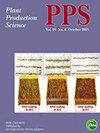Effects of waterweed compost derived from Lake Biwa on Komatsuna (Brassica rapa var. perviridis) growth
IF 1.3
3区 农林科学
Q2 AGRONOMY
引用次数: 0
Abstract
ABSTRACT In Lake Biwa, located in Shiga Prefecture, Japan, the overgrowth of waterweeds has become a significant environmental and human-life problem. Therefore, the waterweeds are systematically harvested and composted. In order to consider the effective use of waterweed compost for carbon neutrality and resource recycling, we clarified the characteristics of the waterweed compost by cultivation experiments with Komatsuna (Brassica rapa var. perviridis). When the waterweed compost (20%) was applied alone, the growth of plants was promoted about 1.7 times compared to a control containing the same amount of fertilizer components. However, the plant showed yellowing of leaves and a high C/N ratio, indicating obvious symptoms of nitrogen deficiency. The application of the waterweed compost (20%) with chemical fertilizer remarkably enhanced plant growth up to about 3.5 times without nitrogen deficiency compared to a control containing only chemical fertilizer. Interestingly, the coexistence of the waterweed compost and chemical fertilizer activated nitrification and diversified soil bacteria (Chao1 index, 213.0; Shannon index, 6.50) rather than the waterweed compost alone (Chao1 index, 41.3; Shannon index, 4.34). Our results indicate that the waterweed compost functions effectively as an organic fertilizer and a soil amendment, contributing to sustainable agriculture. GRAPHICAL ABSTRACT琵琶湖水草堆肥对小白菜生长的影响
摘要在日本滋贺县琵琶湖,水草泛滥已成为一个严重的环境和人类生活问题。因此,水草被系统地收割和堆肥。为了考虑水草堆肥对碳中和和资源循环的有效利用,我们通过小松(Brassica rapa var.perverridis)栽培试验阐明了水草堆肥的特性。当单独施用水草堆肥(20%)时,与含有相同量肥料成分的对照相比,植物的生长促进了约1.7倍。然而,该植物表现出叶片发黄和高C/N比,表明存在明显的缺氮症状。与仅含化肥的对照相比,施用含化肥的水草堆肥(20%)显著提高了植物生长达约3.5倍而不缺氮。有趣的是,水草堆肥和化肥的共存激活了硝化作用和多样化的土壤细菌(Chao1指数,213.0;Shannon指数,6.50),而不是单独的水草堆肥(Chao2指数,41.3;Shannon指标,4.34),为可持续农业做出贡献。图形摘要
本文章由计算机程序翻译,如有差异,请以英文原文为准。
求助全文
约1分钟内获得全文
求助全文
来源期刊

Plant Production Science
农林科学-农艺学
CiteScore
5.10
自引率
4.00%
发文量
27
审稿时长
>36 weeks
期刊介绍:
Plant Production Science publishes original research reports on field crops and resource plants, their production and related subjects, covering a wide range of sciences; physiology, biotechnology, morphology, ecology, cropping system, production technology and post harvest management. Studies on plant production with special attention to resource management and the environment are also welcome. Field surveys on cropping or farming system are also accepted. Articles with a background in other research areas such as soil science, meteorology, biometry, product process and plant protection will be accepted as long as they are significantly related to plant production.
 求助内容:
求助内容: 应助结果提醒方式:
应助结果提醒方式:


